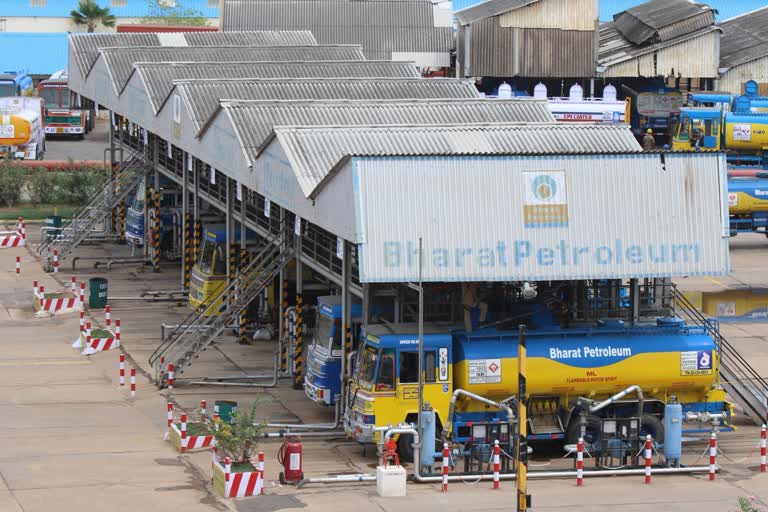New Delhi: World's largest oil company Aramco is yet to make up its mind to participate in disinvestment of Indian fuel refiner and retailer Bharat Petroleum Corporation Ltd (BPCL) where the government intends to sell its entire 53.29 per cent stake to a strategic investor.
Sources privy to the development said that Aramco, which kicked off the final phase of its $25 billion IPO on Sunday, is focused on Indian investment primarily to conclude the purchase of 20 per cent stake in Reliance Industries' oil to chemical division and expansion of its upstream business in high growth markets including India.
Entering India with a large scale investment in a public sector oil refiner and retailer is not on the horizon as on now, sources said.
When asked specifically on its plan to acquire a majority stake in BPCL whether solely or in a consortium, Saudi Aramco declined to comment.
Aramco's lesser focus on BPCL disinvestment may be a cause of worry for the Indian government that is betting big on the oil giant to take over its entire equity in BPCL.
In fact, Finance Minister Nirmala Sitharaman has indicated that BPCL disinvestment may be completed in current fiscal.
While the government is expected to launch a roadshow for BPCL disinvestment in key global markets soon, there is a strong belief that Aramco fits the bill perfectly with its sheer scale of operations and large size of the balance sheet.
"For Aramco, its huge IPO is of prime concern now. It is selling 1.5 per cent stake in the market that could fetch over $25 billion. Other things, including investments in key markets, would come thereafter.
Moreover, with BPCL disinvestment requiring investor to pump in close to Rs 1lakh crore (about Rs 60,000 crore for government's stake and balance for open offer), even a company of the size of Aramco will think twice," said an global oil and gas analyst who did not wish to be named on the issue.
Aramco in the past has remained upbeat about the prospect of investment in the Indian market, which is among the largest oil consumers in the world and where demand scenario is expected to remain firm next few decades.
This mood has also reflected in the 658-page prospectus filed by the company in the run-up to its IPO where apart from its intention to invest in RIL, it has said that company is focussing its downstream investments in areas of high-growth, including India.
The Indian government is also looking at Aramco's investment in $60 billion oil refinery proposed in Maharashtra as well get its investment in oil marketing and retailing in the country.
"The bag seems too full for Aramco already and if at all a decision of BPCL stake purchase is taken, Aramco may join hands with some other Indian or overseas player to pick government of India's equity in the company," said the source quoted earlier.
Public sector Indian Oil Corporation (IOC) has also not ruled out its interest for BPCL but is waiting for a green signal from the government to consider placing its interest.
However, IOC may not have the financial muscle to for large stake buy and the government does not want to add debt burden on PSUs. In such a scenario, analysts believe a possible collaboration between Aramco and IOC may work out.
IOC also has started limited foray in Saudi Arabia by helping set up a few fuel stations. However, government officials denied build-up of any such collaboration at this juncture.
Government's stake is worth over Rs 60,000 crore at the prevailing price of BPCL shares on BSE. If the buyer has to further acquire 25 per cent share in an open offer as per takeover code, the total amount with rising close to Rs 1 lakh crore.
This is considered too high even by international standards.
On its part, DIPAM is working out a plan to offload entire government equity to a strategic partner, possibly a large overseas oil entity like Saudi Aramco, Total, ExxonMobil, Shell.
However, with oil market globally facing a slowdown with demand not picking up despite supply squeeze, the appetite for a large acquisition becomes difficult.
BPCL operates four refineries at Mumbai, Kochi in Kerala, Bina in Madhya Pradesh and Numaligarh in Assam with a combined capacity to convert 38.3 million tonnes of crude oil into fuel. It has 15,078 petrol pumps and 6,004 LPG distributors.
The government proposes to raise Rs 1.05 lakh crore from disinvestment in the current financial year. It had exceeded asset-sale targets of Rs 1 lakh crore in FY18 and Rs 80,000 crore in FY19.
Read more: RBI has cut rates by 110 bps since April, but average lending rates goes up 8 bps: Report



